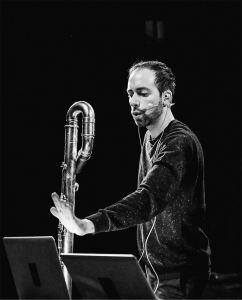It’s been 10 years since Alessandro Baticci began his studies in the mdw’s Tonmeister Education, Flute, and Composition programmes. And next year, he’ll be returning to what’s now his alma mater with a project of his own: DigitAize – Digitised String Instruments.

“I’d gotten to a point where conventional instruments just weren’t getting me any farther,” explains Alessandro Baticci. This freelance flutist, composer, and performer lives and works in Vienna and has for quite some time been devoting himself to musical instruments’ further development—which, for him, has proven to be an essential factor in driving forward his own artistic work. Baticci, a prize-winning composer, conceives of his output as a technological challenge to realise artistic visions by developing new solutions. “Let’s say I get an idea about how I’d like to realise something in a composition. To do so, I need a certain infrastructure – so I go and create it.”
Though he does hold patents, he wouldn’t really describe his work as research—it’s much more of an artistic affair. “Wagner, for example, also commissioned new instruments in order to expand the orchestra’s sonic spectrum. In principle, that was the same necessity we’re talking about here.” Alessandro Baticci always knew he wanted to become a composer. But in order to realise what he had in mind sound-wise, a technological leap forward was necessary. “I wanted to place instrumental playing in the foreground in combination with electronic music as well as computers. So I thought: Why don’t I develop a digital mapping system for the flute that I can use to directly control digital sounds? Then I’d be able to play while also controlling other parameters in real time.” All this is simultaneously based on an ideological aspect: it’s about the deep-reaching integration of acoustic musical instruments into the digitised world. “The most recent developments in this field show a clear tendency towards moving away from acoustic instruments. But I want to go in the opposite direction, placing acoustic instruments in the foreground and working on their further development. These instruments, after all, have qualities to them that would otherwise get lost.”
Baticci views his musical talent and special knack for technical matters as things he inherited from his family—but he’s built out and expanded upon them himself. “I’m very interested in all things technical. And while developing Woodify, I also ended up gathering some initial experience as an entrepreneur.” Woodify is this ambitious inventor’s innovative, patented sonic solution for the flute: a wooden ring mounted on the head joint serves to reduce undesirable vibrations and increase resistance, which greatly improves the instrument’s sound qualities and also makes possible greater expressivity. His products are now sold at a total of fifteen shops in Austria and abroad. The experience he gathered while working on Woodify comes in quite handy for the projects he’s pursuing today. “My current project, DigitAize—which is about digitising musical instruments—has taken on an entirely different magnitude and degree of complexity. Happily, my prior experience helps me make better decisions faster. This is about things that you can’t necessarily study; you simply have to have done them.”
Baticci is currently working together with his colleague Rafal Zalech, likewise an mdw alumnus, on the development of new, expanded string instruments as well as new applications for the music industry. And with their experimental composer-performer duo Nimikry, these two exceptional artists also play their self-designed, augmented instruments in concert. “Nimikry’s work brings together technological innovation and artistic research. Our aim is to use these developments to advance our own art. This always cuts both ways—so I’m sure that once the DigitAize project is finished, we’ll also be on another level artistically, as well.” From autumn 2020 to June 2021, these two mdw alums will be returning to the University with the fruits of their research: the winter semester of 2020 will see students from the Department of Composition, Electroacoustics and Tonmeister Education compose works for digitised string quartet. Rafal Zalech and Alessandro Baticci will be providing the instruments and supporting the composers with technical advice as they work. And at the project’s conclusion, a string quartet from the Joseph Haydn Department of Chamber Music, Early Music and Contemporary Music will perform the students’ new compositions. Alessandro Baticci is currently also in the process of writing an opera supported by a grant from the Deutsche Bank Foundation. This work, set to première in October 2020, is about “roofers”—meaning people who climb atop tall buildings and other structures to take photos there. “Is it just for the adrenaline rush, or is it actually about much more? I want to understand just what’s behind it all, both for the audience and for myself. So I’d like to make a theme of that—and the audience should also be able to really experience something of what it feels like in such moments.”
What drives Alessandro Baticci, personally? It’s the quest to find new solutions and look at problems in new ways, he says—as well as simply reacting to whatever ends up happening at any given moment.

